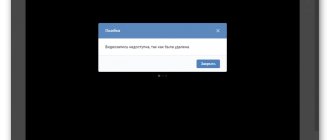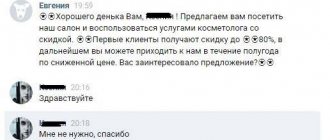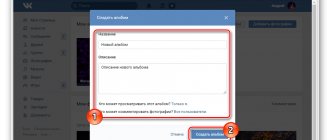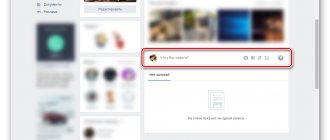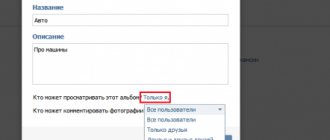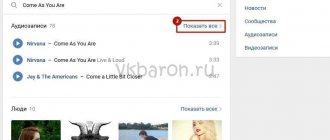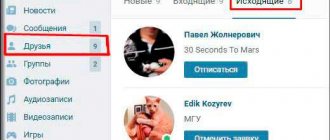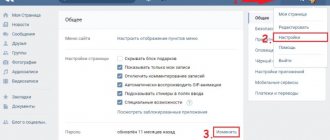On the Russian social network VKontakte, which is famous for its pirated content, user complaints have become more frequent that a large number of entries have been removed from their playlists by copyright holders. Some users, in particular singer Victoria Deineko, received letters asking them to delete a song allegedly uploaded to the social network illegally.
The seizure of audio recordings at the request of copyright holders has already happened before, but these were isolated cases. Now music is disappearing en masse, and for some users, for unknown reasons, the VK Saver client, which allows them to download music from VKontakte, crashes.
Many users admit that they prefer the VKontakte social network, primarily because of access to free music.
Some suggest that individual compositions can be saved from seizure by simply renaming them in your “Audio Recordings” section so that the copyright holder cannot identify them through a search.
However, there are also users who were not affected. First of all, these are those whose audio recordings are hidden by privacy settings and are available only to friends.
UPDATE:
The editors of Roem.ru have obtained a screenshot of the letter that is sent to VKontakte users. Apparently, Victoria Daineko complained about one of these letters:
According to Zuckerberg Will Call, lawyer Elena Trusova, on whose behalf the content removal notices are sent, said she represents the interests of labels such as Sony, Universal and Warner. She has no right to comment on what is happening, and the copyright holders will decide on a PR strategy in this regard later.
Meanwhile, a source among major copyright holders who collaborates with VKontakte unofficially reported that the administration of the social network sends messages to users on its own initiative, without any special sanction from copyright holders.
Let us remind you. A notification will be sent after links to prohibited videos are included in the register of prohibited information.
I can’t upload an audio recording to VK and got the best answer
Reply from 2 replies
[guru]
Hello! Here is a selection of topics with answers to your question: I can’t upload an audio recording to VK
Answer from Vladimir
[guru] nothing. they confiscate by name
Reply from Nima
[guru] Azazazaza, Durov ugh, they don’t have it by name, but by file. So sorry) Look for your song under a different name!
Answer from Yapoval Konstantin Sergeevich
[newbie] I cut off the beginning - intro and everything is ok
Answer from Yatyan Grashin
[newbie] I'm uploading a track stitched together from different tracks. All were taken from VK. It says that “The audio recording has been seized by the copyright holders and cannot be re-uploaded.” Why?
Answer from Alexander Ivanov
[newbie] Similar situation! What did you do? I’ve already gone through two dozen different audio formats, tried all the main bitrates, changed the sampling frequency and bit depth (I’m silent about completely renaming the file - that goes without saying) - it still recognizes the track and writes that it was seized by copyright holders! What is this? Do they have a staff of specially trained listeners there who identify tracks directly by content, and not by checksums? Or has AI and neural network technology already advanced so far that it can recognize content with any acceptable compression and distortion? Comrades, enlighten me, has everything become so hopeless now, or is it still possible to somehow get around this senile ban?
Reply from Denys burka
[newbie] They are complete idiots, why should they prohibit the download? what's wrong with those tracks and what rights might they violate? it's all their stupid inventions
Answer from Maxim Zaitsev
[newbie] Remove 5 seconds from the beginning of the track and run it through an equalizer at this frequency position. The recording quality will not be affected
This phrase, addressed to the founder of VKontakte and the former general director of the company of the same name, will remain a household name for many years to come. Heated debate flared up after the sudden replacement of the system of expressing one’s mood and communicating with friends, beloved by millions of VK users, to the analogue of microblogs familiar to Twitter users. Initially, the founder of the network and the initiator of the upgrade, Pavel Durov, said that the discontent would subside in a couple of days, and users would like the new page design . Nevertheless, the innovation instantly caused real hysteria in the Internet community, which did not subside even after weeks. Hundreds of thousands of indignant visitors to the resource united in protest groups: “We are against the microblog! Give us back the wall!” (the community had more than 520 thousand members) or “Bring back the wall! We are against microblog! (almost 280 thousand).
As a result, a violent reaction forced Durov, as users define it, to “turn on the reverse” - after almost two weeks, the social network VKontakte returned the old, familiar design, although leaving it on par with the innovation. In order to return the wall, in the settings it was necessary to check the option “Always show information about me in expanded form on my page.” The microblog service was also preserved, but moved down to the place of the “wall”.
Loading blocked audio recordings on VKontakte
I have been a reader of Habr for a long time, but have not yet written a single article. This post prompted me to write this article: Blocking audio recordings on Vkontakte. Restoring the playlist. I liked the methods used by the author to bypass the VKontakte filter, but as a person who has been involved in sound processing and writing music for a long time, I can say that this is not the best decision that can be made in this situation, and here’s why: 1. The quality deteriorates audio recordings, with repeated conversion and deliberate deterioration of quality. 2. Cutting a piece of a piece changes the music. I propose a slightly different approach to solving this problem. Anyone interested in the topic, please see cat. I'll go into more detail about several methods that you can use to bypass the filter, including a method that allows you to download blocked music without changing its content (i.e., completely preserving the sound). All tests were performed in the Audacity program; a song performed by rapper Pitbull and singer Marc Anthony, called Rain Over Me, was selected for analysis. This particular song is suitable for the test for several reasons: it is “banned” on VKontakte, all frequencies are present in its spectrum in full, it has both “quiet” and “loud” parts, which will allow you to experiment with dynamics. First, let's make sure that it is impossible to listen to the audio recording, because... it was removed at the request of the copyright holder:
As you can see, it’s true that the original audio recording has been seized, and when we try to download the same one, we will receive a warning about copyright infringement: Loading the same audio recording, but under a different name, was also unsuccessful. There were no tags in both entries (the original and the version with the changed name). Now let's try to load the same audio recording, slightly changing it in some way.
Ways to bypass the filter
Changing the tonal balance of the entire work, or part of it, that is, processing with an equalizer:
In my opinion, this is the simplest method. Let's look at several cases of using EQ: Here I immediately present the result of what I came to; in fact, I unwisely began to try to “feed” an audio recording with a slightly changed tonal balance to VKontakte, so that it was practically impossible to hear the difference (for example, I used a low-pass filter and high-pass filter with very soft settings - the difference in sound was negligible). VKontakte rejected entries with such changes, but, interestingly, accepted them processed like this: This means that recognition occurs only in the mid-frequency region, high and low frequencies are not affected. The first option is to equalize the entire track: you need to cut out a small area of the mid-frequency range. I tried to apply EQ only to a small section of the track - it didn’t work.
Adding noise
In the comments to the article, user Gorthauer87 suggested “a little mixing of some noise imperceptible to the ear.” The idea is correct; in fact, it was the very first one that came to my mind. The recording industry has long used dithering, which is nothing more than adding noise, although now the noise is going through the stage of noise shaping - i.e. the frequencies most audible to the human ear are removed from it. Adding enough white noise to be heard clearly did not help the audio load. This method is not suitable for us, because if the noise can be heard, then we can assume that the audio recording is damaged and cannot be listened to =(
Working with Track Dynamics
After processing the entire track with a compressor with fairly “soft” settings, the audio recording was successfully loaded. Here is a screenshot of the compressor settings: It is quite problematic for an unprepared listener to hear the difference with the original, but if you listen with headphones or on low-quality acoustics, it is impossible.
"Crown" method
But this method surprised me with its simplicity, while it turned out to be the highest quality of all those discussed earlier.
You just need to add a small piece of an arbitrary signal to the end of the track (after the music has ended). As a result, the useful signal does not change in any way, but the VKontakte website does not try to block such tracks. In this particular example, I added a 440 hertz sine wave to the end of the piece, the duration of the noise is approximately 1 minute. If this article is of interest to readers, then I can take a closer look at each of the methods of downloading music (I guess that the “crown” method will soon be “covered”), depending on the material (classical, rock, pop, electronics). Each of the options will work better on one material and worse on another, that is, in some places it is more noticeable to a person, and in others practically without changing the source. The article turned out to be not as complete as I would like, for the reason that my DAW refused to work and began to throw an error (so I did all the work in Audacity). I assume that there are several more ways that will work: 1. Working with the stereo base (its expansion/constriction) 2. Processing the entire track with a multiband exciter
3. Multiband compression of the mid-frequency range, to a much lesser extent than discussed in the article. 4. Adding a very weak reverberation signal, inaudible to the human ear.
5. Expansion, both single and multi-lane.
If there is an opportunity to work on a powerful DAW, then I will be able to consider these cases.
Conclusion
I am not a supporter of copyright infringement, since I myself am involved in creating music, but I believe that the situation with copyright in our time has gone beyond all acceptable limits. Prohibitions and restrictions are only temporary solutions that will not eliminate piracy; it is necessary to solve the problem completely, stimulating alternative means distribution of music.
In reality, which of those people who suffered from the deletion of VKontakte audio recordings will go to the store and buy a CD? Or will they buy music online? *A sample audio recording was taken from the website youtube.com, where it was posted in the public domain by the copyright holder. The audio recording was used solely for research purposes.
Tags: AdBlock stole this banner, but banners are not teeth - they will grow back
More details
habrahabr.ru
Editing an added file
As a rule, a music file downloaded from a computer must be edited - indicate the name of the artist and the title of the song. Perhaps you want to make some changes to a record added from the server (adjusting the name of a track or group). You already know how to upload an audio recording to VK, so next we will talk about editing it.
First of all, open the section where your music is located on the site. Select an audio recording and click on the button with the image of a pencil on the right. A window will open where you can enter the title and artist.
By clicking the “Advanced” button, you can set the genre for the track, as well as write the lyrics of the song. When editing is finished, save the changes by clicking the appropriate button.
How to download blocked music on VKontakte
Home » Instructions and lessons » How to upload copyright-infringing music to VK VKontakte has implemented many different filters that block certain actions and, as a result, interfere with the full use of the resource. These filters also include processing of downloaded music. In some cases, an audio recording, at the request of the copyright holder, may be withdrawn from public access and not available for listening, and if you try to upload it again to your list of audio recordings, it will still be automatically deleted. In this article I will tell you what methods you can use to download blocked music so that it remains unchanged and is not blocked by the administration. Some try to solve this kind of problem by changing the format or name of the composition, but unfortunately such manipulations do not help and blocking still occurs. But this is not a problem, because there are a number of methods, and about one, probably the simplest, read on. This method will require the presence of one program - Adobe Audition, which can be downloaded from the link below. This program was created for various conversions of music tracks. In our case, we will only change one parameter.
- Launch the installed program and load the previously downloaded track into it.
- Now you need to go to the “Effects” menu, then “Time and Pitch” and select the “Stetch and Pitch” tool.
- In the window that appears, you need to set the “Pitch Shift” parameter to 0.02 (as shown in the screenshot) and apply the changes.
- Now you can save the song and safely upload it to your VKontakte page.
DOWNLOADAdobe Audition
Popularity rating: 1490 • Date: 1-08-2016, 12:25
Similar materials
nonsoc.com
“Durov, return the rating”
A similar, but much smaller event took place in May 2011, after the administration of the social network VKontakte decided to remove the small “rating bar” under the avatar, which up to a certain point showed the degree of completion of the page, and after 100% it secretly indicated the coolness of this or that another user. Even at the dawn of VKontakte’s popularity, a lot depended on the rating - for example, users with less than 30% were once unable to view other people’s pages. And on the contrary, incomprehensible to a simple user, but very important for lovers of popularity, “101 percent or more” made it possible to gain fans, as well as to appear in certain lists (both among users and in groups) in the top positions. By the way, many even paid real money for this (7 rubles for 1 point). It is not surprising that when in May 2011 the administration decided to abandon ratings altogether, top users in the past were indignant. However, their dissatisfaction did not go further than outpourings on the Internet.
Only once in the history of VKontakte has it returned an option from five years ago, to support 11-year-old Stepan Savelyev. The unpopular boy was bullied by his classmates, who ridiculed him for the small number of likes on his page, as well as for his childhood fascination with dinosaurs.
How to upload music to contact if it violates copyright?
prg-rb
(No Ratings Yet)
How to upload music to contact if it violates copyright?
- It helped the first time, but it didn’t work the second time!
- Alas, as soon as you start downloading music from sites, you automatically become a violator of copyright and related rights! To avoid this, a complex but legal procedure is provided: you find the copyright holders (not the fact that these are necessarily the authors of the musical works) of the songs you are interested in and enter into appropriate agreements with them for the use and further dissemination of the result of their intellectual activity (if they are the authors ) and agree directly with each person on the amount of remuneration for transferring the corresponding rights to you. Or maybe they will agree to transfer these rights to you free of charge, that is, for nothing!
